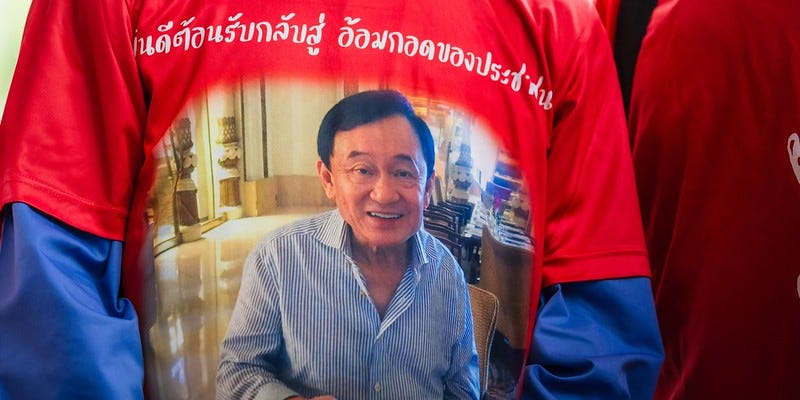The Elephant Outside the Room
Thaksin Shinawatra's omission from the upcoming no-confidence debate

After weeks of disagreement, Thailand’s parliamentary opposition has finally agreed to take out the name of Thaksin Shinawatra from their motion to launch a no confidence debate. Originally, as I wrote about here, the People’s Party (PP) had intended to put the role of Thaksin in the Paetongtarn Shinawatra administration as a topic for debate. The opposition accused the Prime Minister of “allowing her father, Thaksin Shinawatra, to induce and manipulate [her] to conduct or abstain on important affairs of state, conducting herself as though she were a puppet prime minister, with her father as the true prime minister who does not have to take responsibility for how he uses power.”
Strong words, certainly — so it was hardly surprising that Pheu Thai would have objected instantly to allowing this debate topic. Luckily for them, the Speaker of the House of Representatives, Wan Muhammad Noor Matha, decided to take up this case. (“Wan Noor,” as he is usually called, is from the coalition-member Prachachart Party and served in Thaksin’s previous cabinets). The Speaker asked the PP to amend their motion and remove references to Thaksin, threatening that he might refuse to schedule the debate. Wan Noor, for his part, argued that debating the role of an “outsider” (i.e. a non-MP, non-cabinet minister) is not permitted by the parliamentary rules and that it would have lead to countless objections, rendering the session dysfunctional. In his 40 years in parliament, he declared, outsiders have never been listed in a motion for a debate.
For one, that is not accurate: BBC Thai found several instances where outsiders were discussed in just the past few years. The BBC also argued that parliamentary rules does not actually ban the mention of outsiders, but simply notes that parliamentary privilege does not cover such discussions (as I understand it, that means the MP could be sued for defamation). Wan Noor also tried to give the PP an alternative by asking them to simply discuss the matter without naming names, because “everyone already knows who they are referring to.” The opposition has finally agreed to comply, although the Prime Minister has now said that she has heard the term “that man” will be substituted for Thaksin’s name during the debate.
The Speaker may very well be correct that everyone already knows who MPs will be referring to when they talk about “that man” during the no-confidence debate. The man looms large, after all. But the mere fact that MPs cannot openly debate the role of Thaksin will diminish Thai peoples’ faith in their substandard democracy even further.
During the Srettha Thavisin premiership, I coined the moniker “COO State” to describe the arrangements behind the Pheu Thai government: Thaksin had been famous for calling himself the CEO of the government while he was prime minister, but Srettha appeared to be more of a Chief Operating Officer who was only the de jure head of government. This situation continues to prevail under Paetongtarn, but in an even more public fashion as Thaksin has stepped up his political activities. This is by his own admission: Thaksin has openly said that he does not “control” but instead “possesses” Paetongtarn, due to their family ties. A no-confidence debate that only discusses the COO of the government is thus, by definition, incomplete.
Pheu Thai, of course, is free to dispute my assumptions. But it is an assumption that I am certain is shared by millions of Thais, and one that should be aired in parliament without having to leave Thaksin as the elephant outside the room. Would the Speaker have made the same argument if the opposition had accused Paetongtarn of succumbing to the influence of an external figure who is not Thaksin? Why grant the exception just for her father?


I think it may be debatable that TH is even a “substandard” democracy ! Great piece, Ken.
Great article, Ken. I think it is questionable that Thailand is even a "substandard" democracy!!